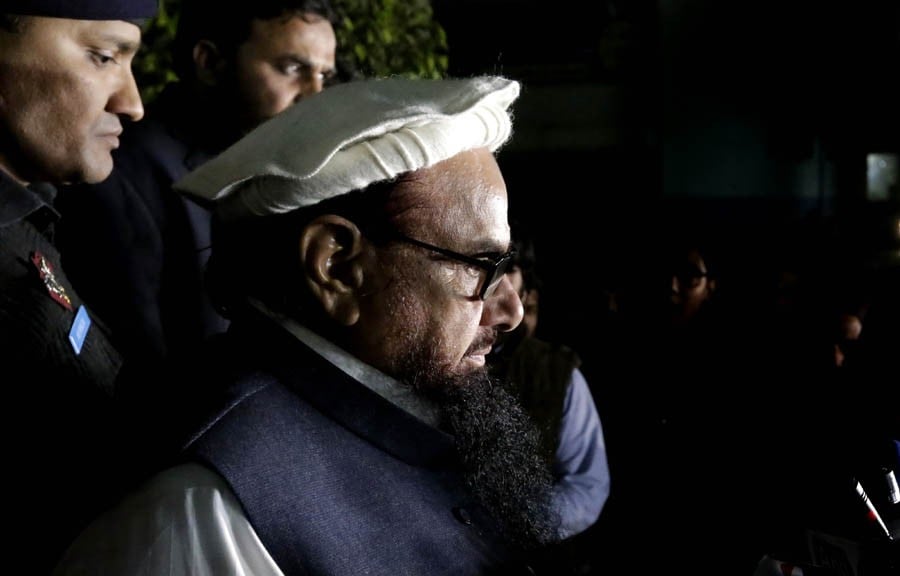
Reports suggesting plans of mainstreaming JuD have surfaced

Hafiz Saeed remains under house arrest. However, his organisation, the expansive Jamaatud Dawa (JuD), along with its social welfare wing, the Falah-e-Insaniyat Foundation (FIF), continue as it is. This was apparent in the immediate aftermath of the Charing Cross bombing in Lahore, where workers from the FIF were not only amongst the first responders, but worked alongside other state institutions such as Rescue 1122, and the Army.
This is nothing new. The JuD’s social welfare work has always been its trump card. From the earthquake of 2005 to the floods of 2010, and countless terror attacks inbetween and after, the JuD along with other religiously inclined groups such as the Sipah-e-Sahaba Pakistan (SSP) have busily been winning the hearts and minds of the common, conservative Pakistani, sometimes even operating in places where state machinery has no footprint.
However, the recent arrest of Hafiz Saeed, and an alleged crackdown on the JuD has forced the organisation to begin a process of rebranding. And by naming itself Tehreek-e-Azadi-e-Jammu and Kashmir (TAJK), the JuD may have played a masterstroke.
"Kashmir is the only socially acceptable, nearly state sanctioned form of jihad," says an Islamabad-based counter-terrorism (CT) analyst, who asked to remain anonymous due to his on-going involvement in counter-terrorism efforts across the country. "By adding Kashmir into its name, the JuD has signalled that it’s not going to give up the Kashmir issue in any way." This rebranding may also increase the group’s ability to gather funds through charity drives across the country. "Kashmir is a cause everybody is willing to give money for," says the CT analyst. "And the entire state machinery is complicit in this."
Whilst all this rebranding takes place, reports have resurfaced suggesting plans of mainstreaming militants who don’t threaten the state, a clear reference to the JuD and the Jaish-e-Mohammad (JeM). The first such inkling came in October 2016 on a local tv talk show where Lt. General (r) Amjad Shoaib spoke of two separate ISI-led plans to bring the JuD and other groups into the mainstream.
The first plan was to involve some parts of the JuD into mainstream politics, whereas the second one involved recruitment of violent extremists (from the JuD and other such groups) into the Rangers and FC, after necessary de-radicalisation and segregation.
"Rehabilitation of individuals involved in terrorist activities is a separate matter altogether," says security analyst Amir Rana. "For groups such as the JuD that had infrastructure across the country and a massive support base as well, political mainstreaming is most important."
Rana believes that once the JuD is brought into politics, they will be swept by the demands of electoral politics and will slowly find the space for dialogue and interaction with other segments of the society.
The real challenge, Rana says, will be countering the ideology that the JuD brings to the political landscape, and this responsibility will fall on the liberal left and moderate secular voices of Pakistani society. He believes that both the liberal left and this radical and emerging far right have never co-existed together. "Societies do not progress like this. Both these segments need space to move ahead, and while the confrontation of narratives will continue, to stem the possibility of violence and terrorism, they need to be brought into the mainstream."
There are other grey areas as well. Historically there have been several half-hearted clampdowns on the JuD but it has continued to exist and operate. "It will all depend on how serious the state is, in following through with the mainstreaming," says Tariq Parvez, former Director General of the Federal Investigation Agency (FIA) and the National Counterterrorism Authority (NACTA). "Also, to what extent will the leadership of the JuD be convinced of the realignment?"
According to Rana, this entry into the mainstream is what JuD wants as well. "Their entry into politics is now imminent."
This possible entry into the mainstream may cause serious problems elsewhere. Most of the recruitment and charity drives done by groups like the JuD have been done under the banner of Kashmir -- and if this cause is abandoned, their access to funds and recruitment will severely diminish. "Their rationale for existence will cease if they let go of Kashmir, that’s how they get all their charity," says Parvez.
"The indoctrination of the cadres (on Kashmir) is so strong that it may cause people to break away from the JuD and look for other militant groups to work with," he says. And Daesh, the newest brand in the terrorist landscape may be the most viable option. "They (Daesh) are also Ahl-e-Hadees and will provide an effective platform for those dissatisfied with the recalibration of JuD."
And then there’s the Jaish-e-Mohammad to contend with as well. Like the JuD, the JeM has never conducted any operations inside Pakistan. "While Jaish is not a large organisation, it has considerable infrastructure, but most importantly, they have deep ideological linkages with groups such as the TTP and al-Qaeda," Rana warns.
The idea of a defanged JuD becoming part of electoral landscape may sound good on paper, but it ultimately depends on two things. One is whether the state is actually going to go ahead with the process, and bear its consequences, and two is whether the JuD will accept this forced recalibration.
"It may just be that the state has finally woken up to the possibility that an uncontrolled JuD will cause a greater threat to Pakistan than all the other groups that we have contended with, in the past," says the CT analyst.